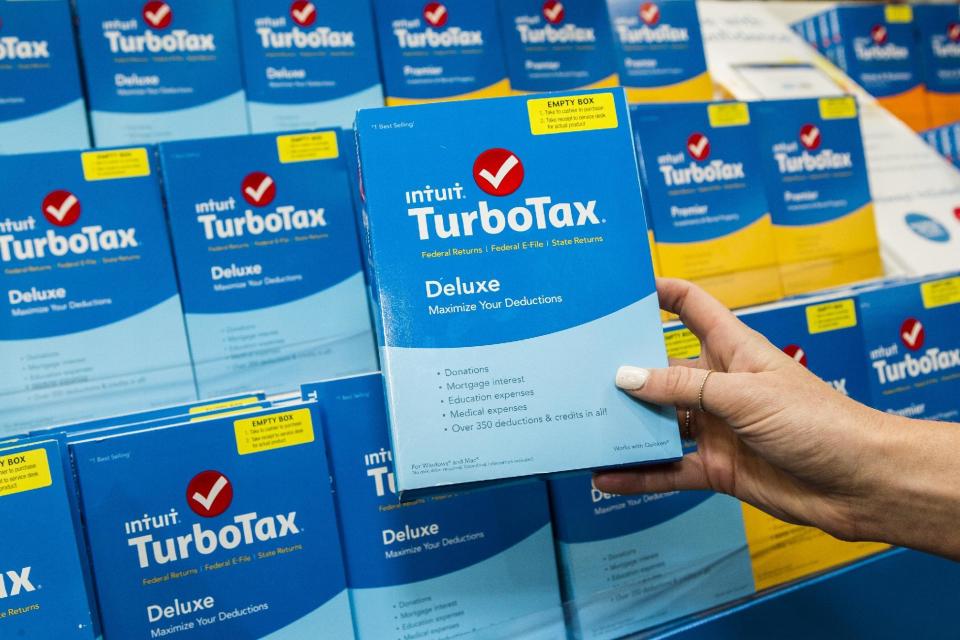These 2 companies lobby to make your taxes more annoying
Do you have a question about your taxes? Email them to us at moneyquestions@yahoo.com
Each spring, Americans are collectively aggravated by filing taxes. The problem isn’t paying them—that’s usually done each paycheck—the problem is filling out arcane forms, using a website to help you, or having to hire someone to just take care of the whole thing. It’s a massive waste of time. There is a better way, however.
The tax forms, like the W-2s and 1099s, that arrive in your mailbox are not just sent to you. Your employers and financial institutions also send them to the IRS, which compares those forms to the numbers you or your accountant puts in the little boxes.

Do you have a question about your taxes? Email them to us at moneyquestions@yahoo.com
If they already have this information, why the heck are they asking you for it? This is the idea behind “pre-prepared returns,” which is a system favored by many countries in Northern Europe like Denmark, Estonia, Finland, Iceland, Norway, and Sweden.
According to the Tax Foundation, the vast majority (just under 70%) of Americans take the standard deduction instead of itemizing. For pre-populated returns, the idea would be the IRS sends a filled-out tax 1040 with the standard deduction and information filled in. For 70% of the country, filing taxes would be as simple as reading over the form, sending it back, and waiting for a refund.
In the past, this idea has enjoyed bipartisan agreement, and supporters for this kind of tax filing reform have included Presidents Ronald Reagan and Barack Obama. Last year Sen. Elizabeth Warren (D-MA) introduced the Tax Filing Simplification Act of 2016. It was introduced and died in the Committee on Finance, as many bills do.
Bipartisan support, no progress
So why has there been no progress despite Reagan/Obama unity? In addition to the general difficulties Washington has reaching agreements, there has been strong lobbying and pushback from companies that benefit from complicated, difficult tax filing, like H&R Block and Intuit, the maker of TurboTax.
“This is a classic story of a very profitable industry—in this case the tax-preparation industry—hiring an army of lobbyists to help rig the system in their favor,” Sen. Warren told Yahoo Finance. “Taxpayers should have the option of choosing return-free filing if they want, but that would mean lower profits for the tax-prep companies that are fighting tooth and nail to block it.”
Both H&R Block and Intuit have in fact a spent a fortune to stifle filing simplifications. Intuit has spent about $2 million on lobbying each year since 2008, according to public lobbying disclosures. In 2016, H&R Block upped its lobbying budget to over $3.2 million. According to an investigation by ProPublica, Intuit has also been linked to efforts to stir up grassroots support against pre-prepared tax returns.
Tax-prep companies do not cite profit as motive, however, generally citing rhetoric along the lines of, “do you trust the government?” These companies also usually note that free solutions like the Free Fillable Forms and Free File exist already, though filling out PDFs may not cut it for angry taxpayers.
In a statement to Yahoo Finance, Intuit VP of corporate communications Julie Miller argued it is in consumers’ best interest to have control over filing, because they alone understand their situation. “The taxpayer alone has all the information regarding the circumstances of their personal lives,” Miller told Yahoo Finance. “This underscores the inherent importance and value of direct citizen engagement in the American Voluntary Compliance process.” Additionally, Miller argued that doing one’s taxes was a good annual ritual that compels people to review their finances.
In a statement responding to ProPublica’s reports about its lobbying efforts, Intuit also described “return-free” filing as removing “the ability for the government to employ the tax system as a channel for implementing economic policy,” such as tax credits to eligible filers.
This is correct, but the argument is a straw man, since filing simplifications like “pre-populated” tax returns isn’t the same thing as “return-free” filing, which is doing away with tax returns altogether and letting the government simply send you a bill or a check.
“If it’s just government pre-populating return system, then [Intuit’s} statement doesn’t apply at all because in pre-population, it’s sending you info it already has,” William Gale, co-director of the Urban-Brookings Tax Policy Center, told Yahoo Finance. “If you’re talking about a literally return-free system, then they are correct that it limits the extent that tax policy can be used to provide target subsidies.”
In the pre-populated scenario, taxpayers would still check over work, demonstrate eligibility for tax credits, and review their yearly finances.“‘Return-free’ requires a much stronger set of simplified tax rules than pre-population does,” said Gale. “And most countries [that have tax return simplification] do pre-populated, not return-free.”
It seems likely nothing will change anytime soon, but it’s clear that the current way is just not working out that well, perhaps best illustrated by an analogy from Joseph Bankman, a Stanford law professor. “Imagine if your vehicle registration fee was done the same way. Imagine if the state said, ‘Go to your car, find your [Vehicle Identification] number and then look at this table that has different tax rates to find out how much you owe.’” In this analogy, the VIN number is your income, which the government already knows. “If they did, people would probably need to hire an expert for that too.”
Ethan Wolff-Mann is a writer at Yahoo Finance focusing on consumer issues, tech, and personal finance. Follow him on Twitter @ewolffmann. Got a tip? Send it to tips@yahoo-inc.com.
Read more:
GOP healthcare bill betrays key Trump campaign promise
Here’s how a Fed rate hike affects you
Chase’s Sapphire Reserve is very worth it, even with its slashed bonus
President Trump’s predecessors learned about tariffs the hard way
51% of all job tasks could be automated by today’s technology
